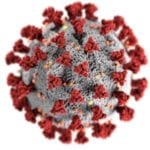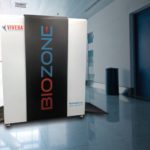Oosto is encouraging businesses to embrace contactless access control as they prepare to bring employees back to the office during the pandemic. To illustrate the point, the company has sponsored a new study that identifies some of the most contaminated surfaces in a standard office setting.

The actual study was carried out by Bio-Lab Ltd., and looked at multiple surfaces to figure out which ones had the most microbial activity. Oosto noted that many viruses can live on a surface for up to 48 hours, so surfaces with more microbial colonies create a greater risk of transmission for visitors and staff alike.
In that regard, Bio-Lab found that the lobby light switch was the most contaminated surface in the office, with 280 microbial colonies per gram. Other areas of concern include the chair handle in a private office, interior door handles, and shared printers, with microbial counts of 280, 130, and 120, respectively. Couches (60), tables (40), coffee machines (30), and exterior front door handles (30) were other surfaces with high viral activity.
Generally speaking, the problem areas fell into one of two categories. Some (like the lobby light switch and the meeting room door handle) are common touchpoints that are used by many people throughout the day. Others (like chair handles) are used less frequently, but are not cleaned as often as more obvious areas of concern. Oosto also warned about shared fingerprint sensors, which are used by many people and not sanitized as often as they should be. Fingerprint sensors were the 16th most-contaminated surface in the Bio-Lab study.
The study was conducted in an office with roughly 100 regulars. Though it was commissioned in response to COVID-19, the study examined many common pathogens, including Listeria, Salmonella, and E. Coli. Oosto argued that its facial recognition technology can enable contactless authentication, and that computer vision can be integrated into surveillance cameras to monitor social distancing and enforce occupancy limits and mask mandates.
“Pre-Covid-19, employee safety was mostly about security, allowing only authorized people to enter and alerting the presence of people on a watchlist such as shoplifters or casino cheaters,” said Oosto Sales VP and Americas GM Paul Witt. “A growing number of organizations are turning to touchless technologies such as facial biometrics to minimize risks associated with COVID while maintaining the health of employees and visitors.”
Oosto will be discussing the benefits of contactless access control during a FindBiometrics webinar on January 13. The company has also spoken out against Clearview AI and advocated for the ethical use of facial recognition technologies.
–
December 23, 2021 – by Eric Weiss







Follow Us